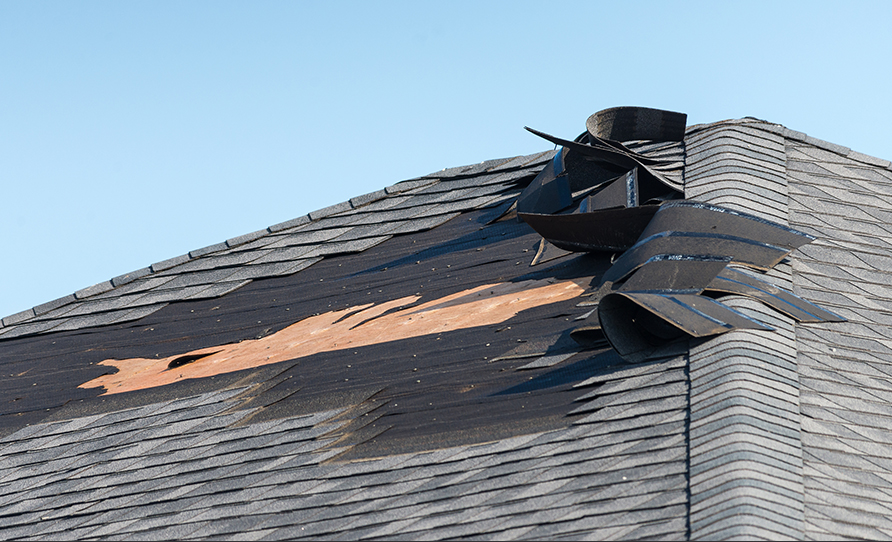It is illegal for a contractor or a roofer to offer or waive a ductile or promise a discount. Most state insurance regulatory agencies have various guidelines in place to avoid this type of practice. Reliable contractors should offer any type of incentive to their customers to NOT pay a deductible. The legal system is in place for a reason — to protect consumers and avoid scam artists that try to avoid their responsibilities by cutting corners.
What is roofing replacement insurance?
Most homeowners insurance contracts cover the replacement of a roof due to damage. Nonetheless, it depends on the state you’re in. Typical all-perils policies cover the cost of replacing a roof if the damage results from sudden accidents or acts of nature. There are, nevertheless, clauses to consider.
- Roofs that are over 20 years old have limited coverage.
- You’ll need before and after photos of the incident.
- You’ll need to keep records of all the repairs done to your roof.
- You’ll need to notify your insurance company as soon as the damage takes place.
- Wear-and-tear, neglect, or gradual deterioration are not covered.
- Sometimes they won’t cover water damage.
- It’s important to perform regular inspections by licensed professionals.
Depending on where you live, your policy might already have your roof covered — in other places, where natural disasters, like tornadoes, hurricanes and squalls are a common theme, insurance companies will not cover repairs on the roof or they might but you’ll have to pay a rider (an extra service and charge, on your premium).
Waiving your deductible
If you need to repair a roof, you’ll most likely have to pay a deductible — a part of the contractor’s estimate that has to be fulfilled before the insurance company releases the claim and cash amount.
Disreputable contractors, to get the job, might offer to waive the deductible or promise to work the estimate. They’ll most likely send your insurance company an enlarged estimate, with a phony paid invoice the deductible — then, they’ll use the whole amount, released by the insurance company to fund the project.
Contractors or this type are, sadly, extremely commonplace. They arrive quickly on the scene, particularly, after a publicized natural disaster, and begin to make a trade. The offer to waive or absorb the deductible and later cut-corners, or give shoddy repairs, or simply don’t meet the criteria of the agreed contract.
Each state has laws in place to decrease this sort of scam. Laws where violators can get hearty fines and even serve jail time. That’s why it is important to find an optional way to pay the deductibles, like Fund My Deductible, and avoid contractor fraud.
How to avoid contractor fraud
It’s important to know what you’re signing when getting into bed with a roofer or a contractor — that legacy binding document is your only protection if things go wrong or if you’re dissatisfied with the service. It’s the infrastructure on which your relationship and what your contractor is responsible for building on.
- Never accept a contractor that’s willing to waive off deductible.
- Get an estimate with clear contact information written in company letterhead paper— or from email accounts that can be traced directly to the company.
- Check references and reviews.
- Get more than one time or bid. Interview various contractors.
- If an estimate is too low or too high, ask for written clarification as to why that is.
- Beware of out-of-town contractors, or those without a business or office, or those that solicit door-to-door.
- Never sign an estimate with blanks on it — always initial every page of your estimate; ask the same of your contractor.
- Never pay upfront — pay in installments.
- Get a detailed estimate of costs, materials, dates, and what their services entail.
Why avoid contractors that offer to waive your deductible?
You’re being complicit in a crime.
Your contractor is scamming your insurance provider/firm and you are in full knowledge of it. You’re not only going against federal mandates, but you are also breaking your contract and policy. If the company were to find out, they will take the action as a breach of contract — might take you to court, will blackball you so you won’t get home insurance in any other company, and will not pay your claim.
It’s against the law
Penal codes prohibit your contractor to waive off, decline, offer rebates on your deductible — the law also forbids you from accepting anything that might offset your deductible.
No legal coverage
If the repair does not go as planned, you have no legal blanket to help you out. You and your contractor both did a felony and are now outside the law and its protection.
Shoddy Repairs
Most contractors that have a habit of waiving off deductibles also have a habit of cutting corners and giving their clients subpar repairs and low-end materials.
Paying deductibles
Homeowners should pay all deductibles relating to roof repairs. There are apps and services available, that can help out. Legal platforms, approved and sanctioned by the law, that aid you in meeting your responsibilities.

